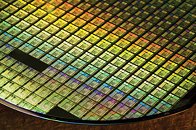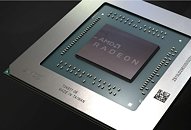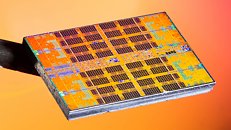Tuesday, September 17th 2019

TSMC Trembles Under 7 nm Product Orders, Increases Delivery Lead Times Threefold - Could Hit AMD Product Availability
TSMC is on the vanguard of chipset fabrication technology at this exact point in time - its 7 nm technology is the leading-edge of all large volume processes, and is being tapped by a number of companies for 7 nm silicon. One of its most relevant clients for our purposes, of course, is AMD - the company now enjoys a fabrication process lead over arch-rival Intel much due to its strategy of fabrication spin-off and becoming a fabless designer of chips. AMD's current product stack has made waves in the market by taking advantage of 7 nm's benefits, but it seems this may actually become a slight problem in the not so distant future.
TSMC has announced a threefold increase in its delivery lead times for 7 nm orders, from two months to nearly six months, which means that orders will now have to wait three times longer to be fulfilled than they once did. This means that current channel supplies and orders made after the decision from TSMC will take longer to materialize in actual silicon, which may lead to availability slumps should demand increase or maintain. AMD has its entire modern product stack built under the 7 nm process, so this could potentially affect both CPUs and GPUs from the company - and let's not forget AMD's Zen 3 and next-gen RDNA GPUs which are all being designed for the 7 nm+ process node. TSMC is expected to set aside further budget to expand capacity of its most advanced nodes, whilst accelerating investment on their N7+, N6, N5, and N3 nodes.
Source:
DigiTimes
TSMC has announced a threefold increase in its delivery lead times for 7 nm orders, from two months to nearly six months, which means that orders will now have to wait three times longer to be fulfilled than they once did. This means that current channel supplies and orders made after the decision from TSMC will take longer to materialize in actual silicon, which may lead to availability slumps should demand increase or maintain. AMD has its entire modern product stack built under the 7 nm process, so this could potentially affect both CPUs and GPUs from the company - and let's not forget AMD's Zen 3 and next-gen RDNA GPUs which are all being designed for the 7 nm+ process node. TSMC is expected to set aside further budget to expand capacity of its most advanced nodes, whilst accelerating investment on their N7+, N6, N5, and N3 nodes.



41 Comments on TSMC Trembles Under 7 nm Product Orders, Increases Delivery Lead Times Threefold - Could Hit AMD Product Availability
I hope this not disrupt their TR3 launches, not in motherboard availability at least, I can live with old gen 2000 series TR3.
i9 9900k performs better in gaming and the z390 motherboards are cheaper than the x570 ones when i was purchasing them.
I really want the Ryzen 9 3900x but priced around $200 more than the i9 9900k when i was buying it.
Don't get me wrong the ryzen cpu's are fantastic and great value, its just unfortunate where im living atm, plus x570 chipset has power and bios issues ( i know it can be fixed via patch but hassles..)
Certain games not working properly with ryzen cpu's as well. Overall the x570 and ryzen 3rd gen cpu is slightly unstable and hence i chose intel i9 over amd ryzen for those various reasons.
Where do you get this stuff? Is that how the companies in your country do this?
If there is a shortage then it would mean the TSMC has underestimated their capabilities or they didn't expect there will be so many wanting the product.
All companies with the signed contracts will get the product in time but with lower quantities then expected till TSMC will fix the production and increase capacity. Otherwise TSMC would have been charged not to deliver anything and I didn't hear anything about that so far.
Also do you know that TSMC has HPC node and low power? So you can't just say AMD is not a big player. AMD is one of the only HPC TSMC partner at this stage, no? Who else is making 7nm High performance products at TSMC? I don't know of anyone but AMD. Plus that contracts are already in place with AMD, so no AMD is not all of sudden getting shown the door. They will get what they are promised and paying for according to original contract. New comers will get the back seat.
So you think AMD is not selling any EPYC chips? So they grew with first gen eypc you expect them to not grow with 2ng gen when it destroys everything out there?
3 year cycle? Is there only one 3 year cycle? lol. So you think there aren't company that have had servers for 3+ years? You would be right if everyone bought at the same time and upgraded at the same time lol. There are many companies who will upgrade. Smart companies will even upgrade earlier if they are getting shit load of more performance, that is more value back in their pocket. They don't think like consumers.
So yea there is always a 3 year cycle every year. People aren't just upgrading form first gen epyc. When you have shit load of market share to gain that just means there are many out there that you can target and with product like ROME they are going to only gain more. It's nonsense to think AMD will be stuck at 3-4% market share. Its only on the front page you know www.techpowerup.com/259314/2nd-gen-amd-epyc-continues-market-momentum-with-new-customers
problem is we don't know the fine details about that contract. the contract can include fine clause about TSMC will take away some of your fab capacity to others if TSMC deemed it necessary. new comers will get the back seat? it depends on who the new comer is (for order). back in 2012 nvidia are complaining that TSMC unable to fulfill their demand for their newest 28nm based product. not long after that TSMC directly made public announcement that they are taking some of Qualcomm and AMD fab capacity to be given to Nvidia. yeah i know some people will hope that things will go all well for AMD. but don't try to dismiss the reality that can happen either. because some of this thing like AMD fab capacity being given to others indeed happen in the past.
It already affects AMD because there might be a shortage involved and deliveries are delayed. not sure what you are after.